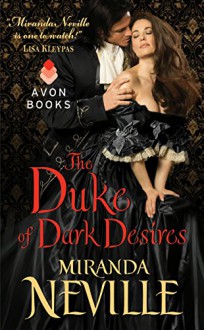
I have no problem with sexually-liberated heroines or premarital sex in a historical romance, or even casual, itch-scratching, no-strings-attached sex (in contemporary settings), but this book made me realize what I've never been able to articulate before: I get squicked out by historical romance novels where the couple consummate their love before the hero is available to commit to the heroine. I'm okay with scenes where it's clear that if they get caught, he'll make an honest woman out of her, even if he hasn't come right out and said so -- but if the obstacle to the couple's happy ever after still appears insurmountable, it really, really, viscerally bothers me if the hero seduces her (or even accepts her invitation, if she's the instigating party). She's the one who's taking all the risk, throwing her reputation out the window, and she's the one who will bear the consequences in a society that places so much stock on a woman's purity, and so for a hero to expose her to such risk when he's not free to make things right should the need arise strikes me as the very opposite of heroic behavior: indeed, it is the height of dishonor.
Unfortunately, this is such a book. Miles Redmond has promised his father he'll woo and marry the daughter of a family friend, and if he does so, the bride's family will fund his next trip to the tropics to continue his life's work (naturalism). However, though the girl in question is totally unobjectionable, Miles is drawn, against his will and better judgment, toward the beautiful but totally objectionable Cynthia Brightly.
Cynthia is objectionable because the Redmond family is all about status, and she doesn't have any: no family, no money, no useful connections. In fact, all of London is abuzz with news that will ruin her--
her erstwhile fiancé dueled and nearly died because she kissed someone else in a garden
(spoiler show)
--so Cynthia attends the Redmond's house party determined to find a husband before the news of her fall from grace reaches Sussex. Cynthia is in truly desperate straits: she has three shillings to her name and no home to return to when the fortnight-long house party ends.
Determined not to let her desperation show, Cynthia sets to work choosing and wooing a husband from among the Redmond's guests, and apart from Miles (who makes clear from the outset that he won't marry Cynthia, though he's happy to steal clandestine kisses in alcoves), she finds three candidates: an older-but-not-decrepit widower who is nice but unattractive, a handsome but rather foppish and shallow young lordling, and an ex-soldier turned moral scholar who is pompous but not immune to Cynthia's charms. All the while, though, she's drawn to Miles though she knows her virtue is the one thing she has to offer her husband, and a dalliance with Miles would put that virtue (and consequently her whole future) in jeopardy.
Good stuff, right? I'm all for a little bit of angst with my romance, and this is a deliciously angsty set-up. There are good, valid, sensible reasons why Miles and Cynthia can't act on their attraction, which is always better than some of the manufactured, I-don't-wanna-love-you-because-REASONS conflicts one sometimes finds in romance. However, the romance feels wrong because--for all Miles pontificates about upholding the honor of his family and keeping his word to his dad and all that--his conduct is, at base, very dishonorable. He pursues Cynthia, stealing kisses and illicit caresses because he doesn't have the will to resist her siren's charms, all while more publicly wooing the milquetoast daughter of his daddy's friend. Meanwhile, Cynthia is also charming other men just as fast and as hard as she can (but in her case, her fickleness is out of true pecuniary desperation, so I'm willing to cut her more slack). It's wrong of Miles to urge Cynthia toward seduction when he can't marry her, and it's wrong of both of them to give in to their base attraction to each other when they have both sought and won the affections of other partners.
When the conflict resolves and Miles decides to tell Daddy he's decided to marry who he pleases, we're supposed to feel good because Miles and Cynthia get their happy ending, but my pleasure was dimmed by sympathy for the potential spouses they'd thrown over, both of whom had been very publicly courted and who both seemed to have honest feelings for the protagonists. In order to enjoy the end of this book, the reader has to forget (or not care) that Miles' Georgina and Cynthia's Lord Argosy must both suffer very public humiliation and very private heartache as a result of being jilted, an injustice all the more unfair because both are innocent bystanders, undeserving of such treatment.
That (major) squick aside, parts of this book were fantastic. One scene in which Cynthia leads the party guests in an ill-advised drinking game is probably the funniest scene I've ever read in an historical romance. I also very much liked Cynthia as a protagonist, though it took me awhile to warm up to her, and while I don't approve of all of her choices, I respect why she behaved the way she did, and I admire the way she squares her shoulders and gets on with the work of surviving even in the bleakest situations, without wallowing in self-pity. She deserves the love and the family she longs for so desperately, and I was glad to see her get her happy ending… I just wish there hadn't been so much collateral damage along the way.


 Log in with Facebook
Log in with Facebook 









